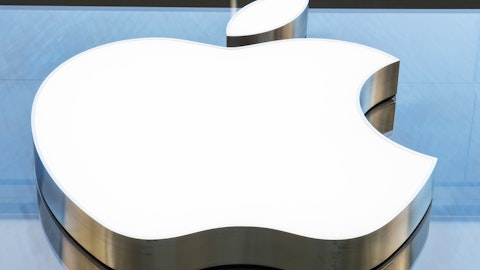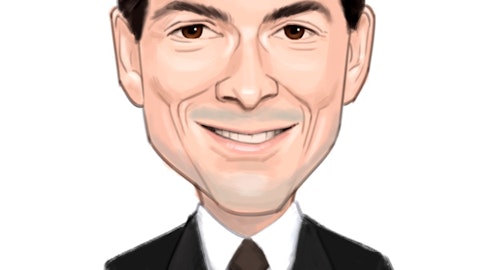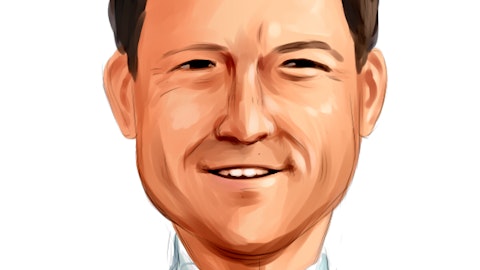At Insider Monkey, we pore over the filings of more than 700 top investment firms every quarter, a process we have now completed for the latest reporting period. The data we’ve gathered as a result gives us access to a wealth of collective knowledge based on these firms’ portfolio holdings as of September 30. In this article, we will use that wealth of knowledge to determine whether or not Apple Inc. (NASDAQ:AAPL) makes for a good investment right now.
Apple Inc. (NASDAQ:AAPL) was in 152 hedge funds’ portfolios at the end of the first quarter of 2016. AAPL has experienced an increase in activity from the world’s largest hedge funds recently. There were 133 hedge funds in our database with AAPL holdings at the end of the previous quarter. Based on these numbers Apple seems to be the 4th most popular stock among hedge funds. At the end of this article we will also compare AAPL to other stocks including Alphabet Inc (NASDAQ:GOOGL) (NASDAQ:GOOG), and Microsoft Corporation (NASDAQ:MSFT) to get a better sense of its popularity.
Follow Apple Inc. (NASDAQ:AAPL)
Follow Apple Inc. (NASDAQ:AAPL)
Receive real-time insider trading and news alerts
It seems to us that nobody is more bullish on Apple than Wall Street analysts. Personally I am bearish. I believe Apple will face significant pricing pressures by the end of the next recession and may lose more than a third of its value. I don’t know when the next recession will happen, but that really doesn’t matter because I am a long-term investor. Most investors think they can get rid of their Apple shares before the company’s earnings decline materially but at the end of the day somebody will be holding those shares. By the way I am not a new Apple bear. I went on the record on CNBC last year when Apple was trading above $130 and Carl Icahn was pushing his $240 price target through the air waves. Icahn sold out of his $5 billion Apple position after seeing the first red flags.
Last week Jeffrey Kvaal from Nomura reiterated his buy rating with a price target of $120, yet he also warned investors about the risks of SE cannibalization: Here is what he said:
“The new iPhone SElaunch has proven more robust than we expected. Global lead times remain elevated and supply chain orders are rising.We consider this a mixed blessing as the strength likely includes cannibalization of the ever-weaker iPhone 6s. Leadtimes in the U.S. and China measured in days ahead of the March launch rose to 2-3 weeks by late April, where theyhave held. Greater China and the U.S. together represent ~50% of sales. We had initially anticipated 10-20mn in theSE’s first year; we now believe volumes will reach 30mn by year-end. Our checks imply that Apple has increased itsproduction forecast. Soft overall demand implies cannibalization in developed markets, China may be better. The handset upgrade rate for the U.S. operators reached a record low of 6% of the sub base in 1Q16. Typical upgrade ratesare ~8%.
While some of the decline is structural (installment/leasing plans), some is cyclical given a dearth of “iconic”phones. The SE strength, overall demand weakness, and our anecdotal work implies the SE is stealing 6s demand indeveloped markets. We believe the SE is reaching its intended market, first-time buyers, in China. Apple intends to lower channel inventory by ~$2bn, or 3mn phones, assuming they are predominantly the 6s. The deepening 6sweakness, of course, will and thus F4Q volumes may not exceed typical seasonality. We model 42mn and 42mn,respectively, which should bring channel inventory solidly below F4Q15’s 4.2 weeks. We also believe Apple will take a conservative view on production to avoid excess channel inventory with the iPhone 7. We find it notable that the supply chain seems equally (if not more) enthralled by the 7s in 2017 (OLED, possibly foldable, bezel to bezel screen, no homebutton, glass casing) as with the 7 (watertight, wireless charging, dual cam).”
Now, let’s take a glance at the latest action surrounding Apple Inc. (NASDAQ:AAPL).
How have hedgies been trading Apple Inc. (NASDAQ:AAPL)?
At Q1’s end, a total of 152 of the hedge funds tracked by Insider Monkey held long positions in this stock, a change of 14% from the previous quarter. With hedgies’ sentiment swirling, there exists a select group of key hedge fund managers who were increasing their holdings substantially (or already accumulated large positions).
According to publicly available hedge fund and institutional investor holdings data compiled by Insider Monkey, Soroban Capital Partners, managed by Eric W. Mandelblatt, holds the number one position in Apple Inc. (NASDAQ:AAPL). Soroban Capital Partners has a $1.69 billion call position in the stock, comprising 13.6% of its 13F portfolio. Sitting at the No. 2 spot is Fisher Asset Management, led by Ken Fisher, holding a $1.243 billion position; the fund has 2.4% of its 13F portfolio invested in the stock. Some other peers that hold long positions comprise Warren Buffett’s Berkshire Hathaway, Phill Gross and Robert Atchinson’s Adage Capital Management and David Einhorn’s Greenlight Capital. Soroban Capital Partners’ and Berkshire Hathaway’s large positions were brand new position (they must have traded against Carl Icahn). Some of the other funds with brand new AAPL positions are billionaire John Griffin’s Blue Ridge Capital, and Karthik Sarma’s SRS Investment Management.
Let’s now review hedge fund activity in other stocks – not necessarily in the same industry as Apple Inc. (NASDAQ:AAPL) but similarly valued. We will take a look at Alphabet Inc (NASDAQ:GOOGL) (NASDAQ:GOOG), Microsoft Corporation (NASDAQ:MSFT), and Berkshire Hathaway Inc. (NYSE:BRK-B). This group of stocks’ market valuations are close to AAPL’s market valuation.
| Ticker | No of HFs with positions | Total Value of HF Positions (x1000) | Change in HF Position |
|---|---|---|---|
| GOOGL | 155 | 14981881 | 1 |
| GOOG | 142 | 14902723 | 0 |
| MSFT | 144 | 20830664 | 4 |
| BRK-B | 71 | 19576045 | -4 |
As you can see these stocks, except Berkshire Hathaway, are as popular as Apple among hedge funds. Interestingly though hedge funds’ positions in these stocks were bigger than their positions in Apple. Collectively hedge funds own 5.8% of Alphabet’s outstanding shares, they controlled 4.8% of Microsoft’s outstanding shares, and they had 5.6% of Berkshire Hathaway’s outstanding shares (we excluded Buffett’s ownership stake in Berkshire). On the other hand, hedge funds control only 2.5% of Apple’s shares. This tells us that hedge funds may seem bullish on Apple on the surface but they are really 50% underweight Apple Inc. shares. I don’t think Apple is a good long-term stock to own.





